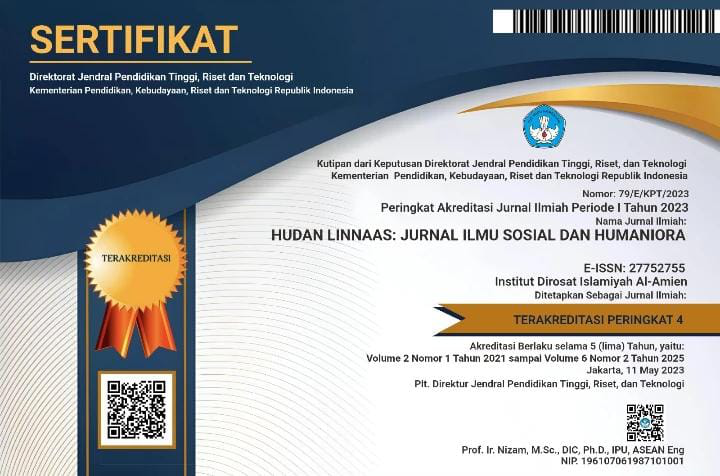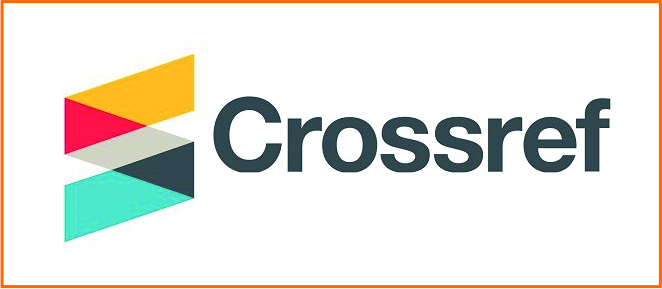PENGUATAN KESADARAN GIZI ANAK SEKOLAH DASAR MELALUI PENYULUHAN SAYUR DAN BUAH SEBAGAI PRAKTIK PENDIDIKAN SOSIAL DI KECAMATAN GANGGA
DOI:
https://doi.org/10.28944/hudanlinnaas.v6i1.2138Keywords:
Nutrition awareness, counseling, consumption of vegetables and fruits, elementary school students, quasi-experimentAbstract
Good nutritional awareness in school-age children is very important to support optimal growth and development. However, the low consumption of vegetables and fruits among elementary school students is a problem that requires educational intervention. This study aims to analyze the effectiveness of vegetable and fruit consumption counseling in increasing nutritional awareness of elementary school students in Gangga District, North Lombok Regency. The method used is quantitative research with a quasi-experiment design using a pre-test and post-test control group approach. Counseling was carried out in the form of lectures with four-minute video media. The research sample consisted of 60 students who were divided into an experimental group and a control group. Data analysis was carried out using the Wilcoxon test to see changes in knowledge and attitude scores before and after counseling. The results showed that there was a significant improvement in students' knowledge and attitudes in the experimental group after being given counseling. The knowledge score increased from 43.00 to 75.00 (p=0.000), while the attitude score increased from 45.33 to 72.60 (p=0.000). On the other hand, in the control group that was not given counseling, there was a decrease in knowledge scores from 44.00 to 38.00 (p=0.039) and attitude scores experienced a slight increase from 41.00 to 42.66 (p=0.059), which was not significant. These findings indicate that without educational intervention, students' nutritional awareness tends to decline or remain stagnant. This study confirms that lecture-based counseling and audiovisual media are effective in increasing nutritional awareness of elementary school students. Therefore, nutrition education programs should be integrated into the school curriculum and supported by policies that encourage the consumption of vegetables and fruits from an early age. Further research is suggested to cover a wider range and use more diverse intervention methods.
References
Anam, K., Norfai, N., & Indah, M. F. (2021). Edukasi Gizi Spesifik Sebagai Gerakan 1000 Hari Pertama Kehidupan (HPK) Dalam Upaya Pencegahan Stunting Balita Pada Siswi di SMK Farmasi Al Furqan Banjarmasin. Jurnal Abdimas Kesehatan (JAK), 3(3), 277. https://doi.org/10.36565/jak.v3i3.256
Chia, A.-R., Chen, L.-W., Lai, J. S., Wong, C. H., Neelakantan, N., van Dam, R. M., & Chong, M. F.-F. (2019). Maternal Dietary Patterns and Birth Outcomes: A Systematic Review and Meta-Analysis. Advances in Nutrition, 10(4), 685–695. https://doi.org/10.1093/advances/nmy123
Coppoolse, H. L., Seidell, J. C., & Dijkstra, S. C. (2020). Impact of nutrition education on nutritional knowledge and intentions towards nutritional counselling in Dutch medical students: an intervention study. BMJ Open, 10(4), e034377. https://doi.org/10.1136/bmjopen-2019-034377
GIBSON, E. L., WARDLE, J., & WATTS, C. J. (1998). Fruit and Vegetable Consumption, Nutritional Knowledge and Beliefs in Mothers and Children. Appetite, 31(2), 205–228. https://doi.org/10.1006/appe.1998.0180
Herlianty, H., Ketut Sumidawati, N., & Bakue, T. (2024). The Importance of Eating Healthy and Nutritionally Balanced Food for Elementary School Children. Abdimas Polsaka, 3(1), 40–46. https://doi.org/10.35816/abdimaspolsaka.v3i1.66
Johnson, C. W. (1986). A More Rigorous QUASI-Experimental Alternative to the One-Group Pretest-Posttest Design. Educational and Psychological Measurement, 46(3), 585–591. https://doi.org/10.1177/0013164486463011
Katz, D. L., Katz, C. S., Treu, J. A., Reynolds, J., Njike, V., Walker, J., Smith, E., & Michael, J. (2011). Teaching Healthful Food Choices to Elementary School Students and Their Parents: The Nutrition DetectivesTM Program*. Journal of School Health, 81(1), 21–28. https://doi.org/10.1111/j.1746-1561.2010.00553.x
Radulescu, A., Killian, M., Kang, Q., Yuan, Q., & Softic, S. (2022). Dietary Counseling Aimed at Reducing Sugar Intake Yields the Greatest Improvement in Management of Weight and Metabolic Dysfunction in Children with Obesity. Nutrients, 14(7), 1500. https://doi.org/10.3390/nu14071500
Sofianita, N. I., Khomsan, A., Setiawan, B., Ekayanti, I., & Crosita Octaria, Y. (2022). Observational study: determinants for vegetable consumption among elementary school students in Indonesia. F1000Research, 11, 1048. https://doi.org/10.12688/f1000research.124754.1
Tripathi, R., Tewari, R., Singh, K. P., Keswani, C., Minkina, T., Srivastava, A. K., De Corato, U., & Sansinenea, E. (2022). Plant mineral nutrition and disease resistance: A significant linkage for sustainable crop protection. Frontiers in Plant Science, 13. https://doi.org/10.3389/fpls.2022.883970
Welch, A. (2021). Micronutrient malnutrition across the life course, sarcopenia and frailty. Pro
Downloads
Published
Issue
Section
Citation Check
License
Authors who publish with this journal agree to the following terms:
- Authors retain copyright and grant the journal right of first publication with the work simultaneously licensed under a Creative Commons Attribution-NonCommercial-ShareAlike 4.0 International License that allows others to share the work with an acknowledgement of the work's authorship and initial publication in this journal.
- Authors are able to enter into separate, additional contractual arrangements for the non-exclusive distribution of the journal's published version of the work (e.g., post it to an institutional repository or publish it in a book), with an acknowledgement of its initial publication in this journal.
- Authors are permitted and encouraged to post their work online (e.g., in institutional repositories or on their website) prior to and during the submission process, as it can lead to productive exchanges, as well as earlier and greater citation of published work.









